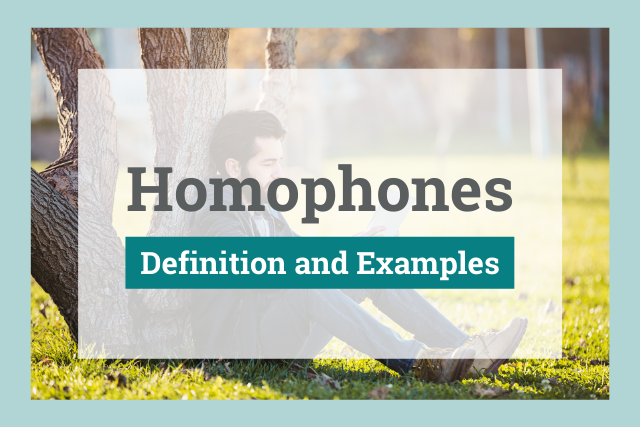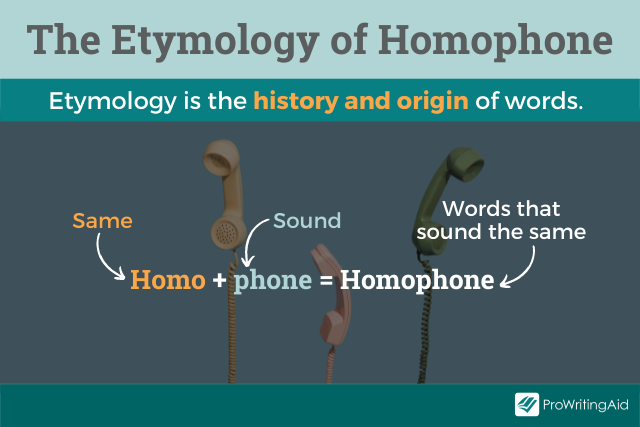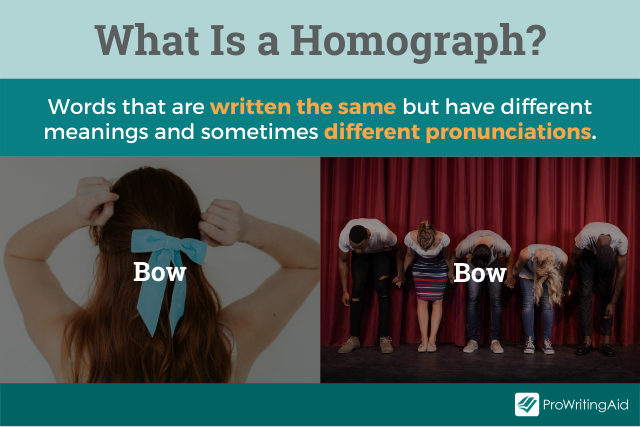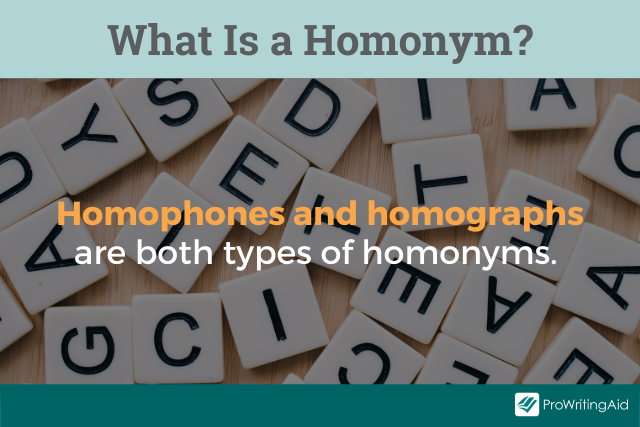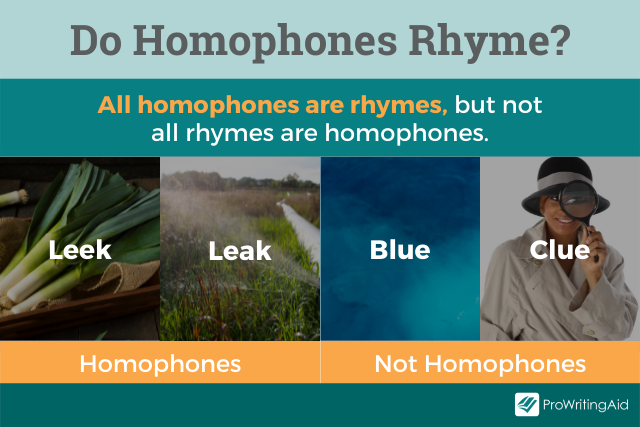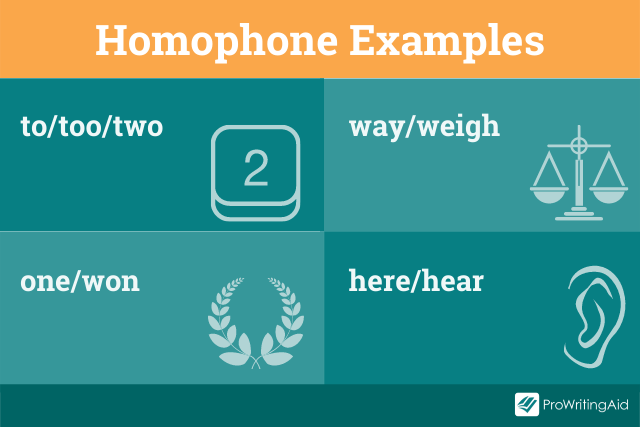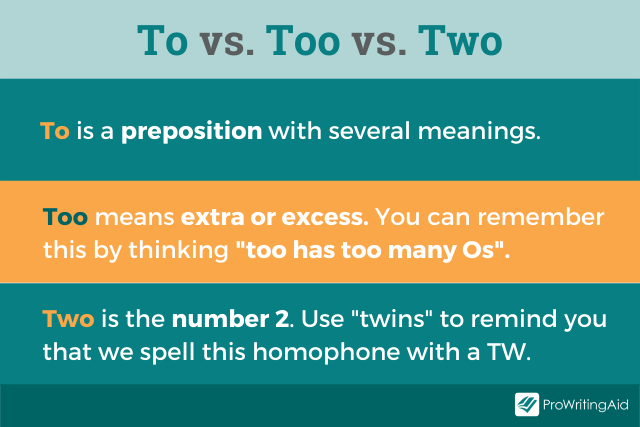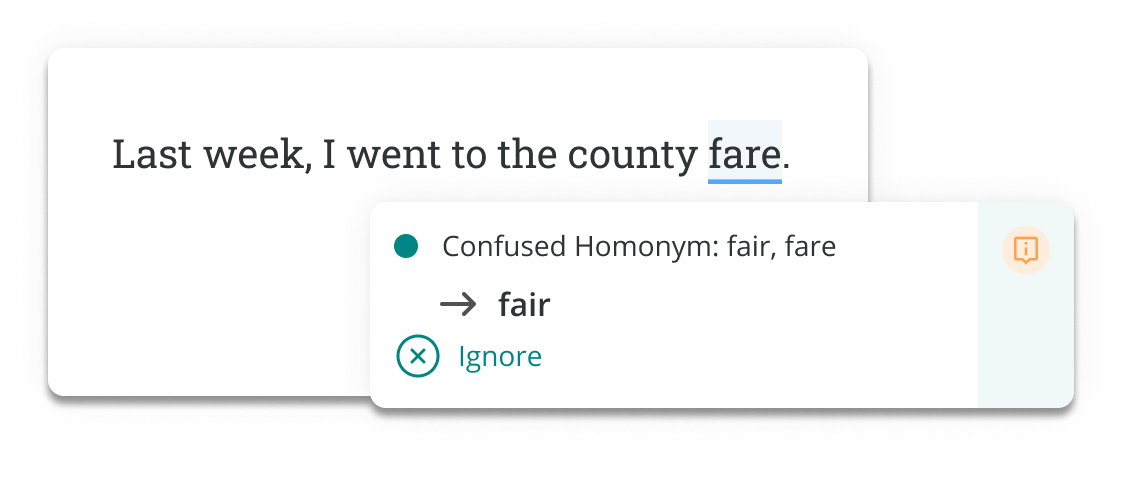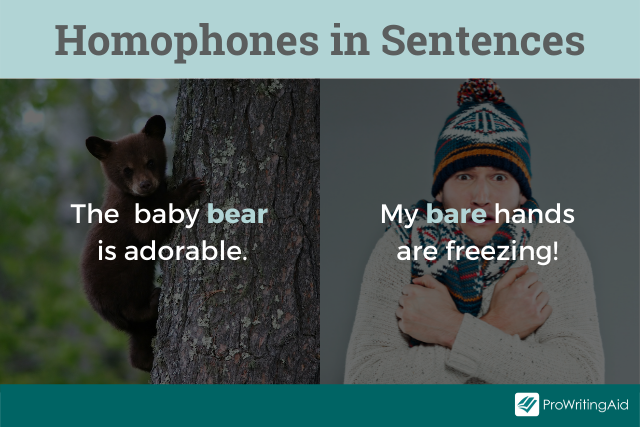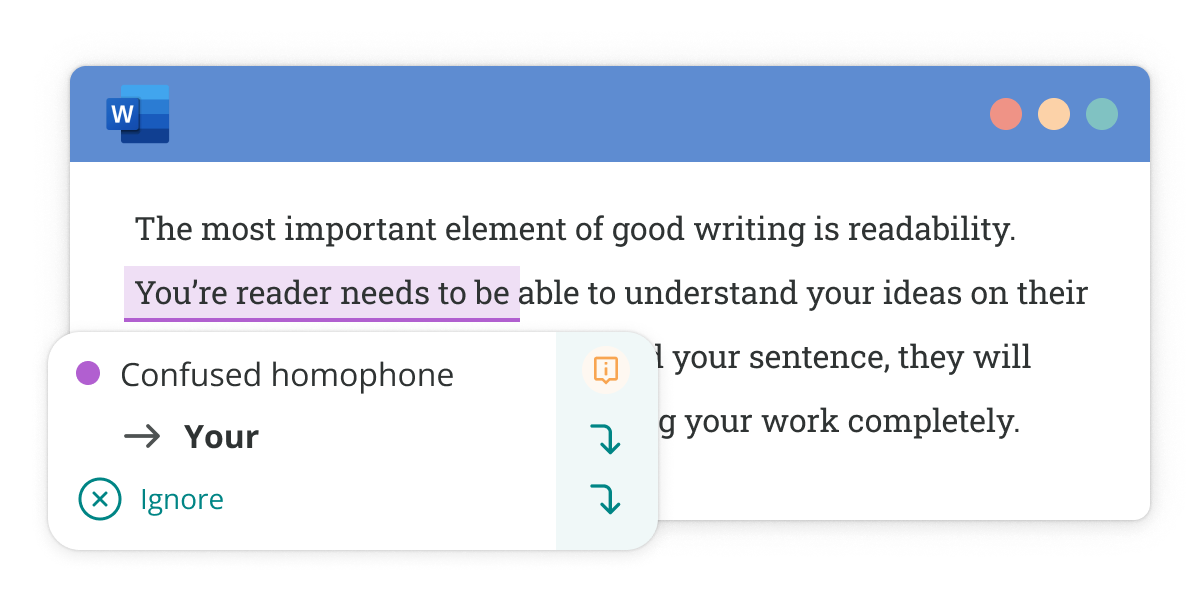Definition of Homophone
A word that is pronounced the same as another word but has a different meaning or spelling (ex. “sea” and “see”.)
Examples of Homophone in a sentence
The English teacher that the word “tea” is a homophone of “tee” and although you might drink the first, you wouldn’t sip on the other.
🔊
The word “buy” has more than one homophone since there are many words that sound like “buy” but are spelled differently.
🔊
The homophone chart lists words are pronounced the same but spelled differently like “two” and “to”.
🔊
Given for homework, the homophone worksheet asks students to list words that sound a like but have different meanings or spellings.
🔊
The writer made a mistake when he used the word “break” instead of its homophone “brake”.
🔊
Other words in the Grammar & English Usage category:
Most Searched Words (with Video)
One of the best ways to learn about homophones is to see how the different words are used in sentences, as this helps to provide some context for how each one should be used.
We’ve therefore created more than 100 homophones sentences below as examples for you to use. Every sentence contains at least two homophones and each one is highlighted in a different color to make it easier to identify. You can also click on each highlighted word to be taken to a page that lists all of that word’s homophones, as sometimes there are more that haven’t been used within the sentence.
To help you further, we’ve also created many free printable worksheets that use some of these sentences to teach about homophones.
Homophones Sentences
- I am short-sighted in my right eye, so I have to wear contact lenses.
- The heir to the throne went flying in a hot air balloon.
- I’ll be walking down the aisle on my wedding day.
- The runner was so hungry, he ate eight sandwiches.
- He was in awe that the rower was able to move the boat using only one oar.
- The band was banned from taking part in competitions.
- One of the lieutenants on the army base liked to play bass guitar.
- You do not want to be stung by a bee.
- She had been craving a bean burrito all week.
- He stopped by the grocery store on the way home to buy some milk.
- The couple wanted to build a house from scratch, so an architect billed them for the design.
- She blew the blue coloring pencil on to the floor.
- He was really bored with playing the same board games all the time.
- The cyclist didn’t use his brake in time, causing his bicycle to break when it hit the wall.
- The police caught the thief which is why he was in court.
- He was desperate for some money, so he decided to sell his cell phone.
- She sent her granddaughter her favorite pop star’s new scent for her birthday.
- She was feeling a little chilly, so she ate some chili to warm herself up.
- The web developer designed a site that could test your sight to see if you were colorblind.
- Of course my face is coarse – I haven’t shaved for a few days.
- The colonel ate a kernel of corn.
- By following each music symbol on the sheet, the percussionist knew when to hit the cymbal.
- Her most dear memory of their vacation was getting to see some deer in the forest.
- There was due to be heavy dew on the ground in the morning, so they brought in their toys so that they wouldn’t get wet.
- The family felt a lot of disgust as they discussed the latest political scandal.
- Did you see the ewe that was in the field?
- The athlete managed to leap a distance of 30 feet in the long jump which was a world record feat.
- The driver was fined for not being able to find his license and registration.
- It was cold outside, so she wore a fur coat while trying to pick out a fir for their Christmas tree.
- There was a flaw with the way the carpet had been laid on the floor.
- They saw a flea on the bed so they decided to flee the motel room.
- The bird flew through the window and landed on the head of someone suffering from flu.
- The golfer aimed for the green before shouting “fore” on hole number four.
- The mother let out a groan when she realized her child was now fully grown and off to college.
- “He’ll have to stay in the hospital for a bit longer to let his heel heal” advised the doctor.
- Come over here so that you can hear what I have to say.
- They were going to have to pay a higher price if they wanted to hire the car for longer than a week.
- It was important to him that his favorite hymn was sung at their wedding.
- The jockey went hoarse telling the horse to giddyup.
- The hole in his sock was so bad that the whole of his big toe was sticking out.
- Our favorite TV show starts in an hour.
- “It’s a very friendly dog” said its owner.
- You need to knead the dough for quite a long time when making bread.
- She knew that the new movie was due to come out this weekend.
- The knight sleeps in the castle at night.
- The knot was not tied well, so it came undone
- The parents didn’t know why their toddler kept saying “no” to everything.
- The racecar driver had a lapse in memory and couldn’t remember how many laps he had completed.
- He leased the car that cost the least amount of money.
- The maid made the bed.
- The person who delivered the mail was a young male.
- The kids got lost in the maze that was created in a maize field.
- The butcher went to meet the farmer from whom he buys his meat.
- The driver missed the road he was supposed to turn down as the mist meant he couldn’t see the road sign.
- The homeowner had a moan that the gardener hadn’t mown the lawn properly.
- The family were still in mourning the morning after the funeral.
- There could only be one person who won first prize.
- The Global Operations manager is the person who oversees all of the staff who work overseas.
- The decorator paced up and down the room while waiting for the wallpaper paste to dry.
- The builder was in pain after accidentally putting his hand through the window pane.
- He made a fruit salad using a banana, a pear, an orange and a pair of apples.
- The truck driver passed a couple of cyclists before driving past a parked RV.
- The hospital was extremely busy, so the patients had to have patience.
- The veterinarian had to pause what he was doing when he saw that the cat’s paws had an infection.
- The beauty queen said her favorite food was a piece of pie and that she’d like to see world peace.
- The student who could remember the value of pi to the most decimal places would be rewarded with a slice of pie.
- The economy cabin of the plane looked plain.
- The camper started to pray that he wouldn’t become the grizzly bear’s prey.
- The jockey decided not to ride in the rain in case the horse’s rein became slippery.
- She chose to raise the blinds so that her plant could soak up more of the sun’s rays.
- The lion let out a roar before consuming the raw meat.
- The boy enjoyed the book he’d read that had a red cover.
- He realized that he’d finally caught a real fish, so he tried to reel it in.
- The gardener had planted the flowers in the rose garden in rows.
- The journalist decided that it was the right thing to write and publish the article, even though it meant the celebrity’s career would be over.
- Some of the travelers walked on the road, some rode on horses and the rest rowed a boat.
- The yacht’s owner couldn’t afford to replace its sail, so he had to put it on sale.
- The carpenter accidentally caught his hand with the saw which meant that it felt a bit sore.
- The movie’s final scene was something that had to be seen to be believed.
- The children couldn’t wait to see the sea.
- The weather was so cold that the farmer decided to wait to sow the seeds.
- The runner sighed as he felt a stitch in his side.
- Working out the sum of all the numbers was too difficult for some of the students to do without a calculator.
- The company’s job advertisement said that they sought someone who could open and sort through all of their mail.
- The car full of stationery was stationary.
- The thieves tried to steal some steel cables to sell as scrap metal.
- The couple who had just got married thought that it was really sweet of the hotel to upgrade them to the honeymoon suite for free.
- The youth group liked to go for an ice cream sundae after church on Sunday.
- The golfers had time to drink some sweet tea before it was their tee time.
- The campers started to feel tense as it was getting dark and they still hadn’t put up their tents.
- “Where are the cyclists?” asked Tom. “They’re over there on their bikes” replied Joe.
- He threw the basketball through the net.
- The chef was in a hurry, so he decided there was no time to chop up some thyme to go in the dish.
- The tide was coming in, so the sailor tied his boat to the dock.
- The parents had only just had a baby, so they decided that it was too early to try for another.
- The driver kicked his car in frustration while waiting for the tow truck, injuring his toe.
- As the dieter’s waist got smaller, all his old clothes went to waste.
- The dieter decided to wait a couple of weeks before checking to see if she had lost any weight.
- In medieval times, soldiers wore chain mail armor when going to war.
- The student asked his parents where he could rent a tuxedo to wear to the prom.
- The mechanic had to warn the car’s owner that the brake pads were really worn down.
- There was no way of knowing how much Little Miss Muffet would weigh after she’d eaten all of her curds and whey.
- The athlete had been training so hard, she felt really weak by the end of the week.
- We’ll need to get a steering wheel cover for the car as it’s too cold to touch in the winter.
- I don’t know whether the weather is meant to be good or bad today.
- “We’d better make sure that we dig up every weed” said one gardener to the other.
- When Dorothy didn’t know which direction to go in order to get to the Wizard of Oz, the Good Witch of the North told her to follow the yellow brick road.
- The customer let out a whine because the bar had run out of wine.
- Who’s that person over there? Is he the guy whose wallet was stolen?
- He decided that this weekend he would chop up some wood for their log fire.
- “You’re on your own if you want to go on the rollercoaster!” said one friend to the other.
Make sure you check out our complete homophones list.
Asked by: Ms. Clemmie Hayes
Score: 4.9/5
(55 votes)
Homophone sentence example
Julie would have aced her quiz if she hadn’t mixed up a homonym with a homophone . You should be very careful about mixing up a homonym and homophone in your test.
What is a good sentence for homophone?
Some common examples of homophones, including the words used in a sentence, are: brake/break: When teaching my daughter how to drive, I told her if she didn’t hit the brake in time she would break the car’s side mirror. cell/sell: If you sell drugs, you will get arrested and end up in a prison cell.
What is a homophone sentence?
Homophone in a Sentence ?
A word that is pronounced the same as another word but has a different meaning or spelling (ex. “sea” and “see”.) Examples of Homophone in a sentence. 1. The English teacher that the word “tea” is a homophone of “tee” and although you might drink the first, you wouldn’t sip on the other.
What are examples of homophones with meanings and sentences?
50 Homophones with Meanings and Examples
- Aunt (noun) or Aren’t (contraction) – …
- Ate (verb) or Eight(noun) – …
- Air (noun) or Heir (noun) – …
- Board (noun) or Bored (adjective) – …
- Buy (verb) or By (preposition) or Bye (exclamation) – …
- Brake (noun, verb) or Break (noun, verb) – …
- Cell (noun) or Sell (verb) –
What are homophones write 10 sentences with homophones?
In the interest of education and fun, here are 10 sentences with homophones:
- You are not allowed to talk aloud in the library.
- The hotel maid made the bed.
- Let’s have buffalo meat when we meet for dinner.
- The bartender had a wry smile when pouring the shot of rye.
42 related questions found
What are the 20 examples of Homographs?
20 example of homograph
- Bear — To endure ; Bear — Animal.
- Close — Connected ; Close — Lock.
- Lean — Thin ; Lean — Rest against.
- Bow — Bend forward ; Bow — Front of a ship.
- Lead — Metal ; Lead — Start off in front.
- Skip — Jump ; Skip — Miss out.
- Fair — Appearance ; Fair — Reasonable.
What is homophone with example?
A homophone can be defined as a word that, when pronounced, seems similar to another word, but has a different spelling and meaning. For example, the words “bear” and “bare” are similar in pronunciation, but are different in spelling as well as in meaning. … Mostly, however, they are spelled differently, such as: carrot.
What is 10 examples of sentences?
Examples of Complete Sentences
- I ate dinner.
- We had a three-course meal.
- Brad came to dinner with us.
- He loves fish tacos.
- In the end, we all felt like we ate too much.
- We all agreed; it was a magnificent evening.
What are two words that sound the same?
Homonyms are words which sound alike or are spelled alike. In a strict sense, a homonym is a word that both sounds and is spelled the same as another word. Think of the word “lie” which can mean “not true” or “horizontal or resting position.” It’s written and pronounced the same.
What is the difference between homonym and homophone?
Homonyms are words that have the same name; in other words, they sound the same and they’re spelled the same. For example, pen meaning the writing instrument, and pen meaning an enclosure for an animal, are homonyms. … Homophones are words that sound the same, but aren’t spelled the same!”
What are palindromes examples?
: a word, verse, or sentence (such as «Able was I ere I saw Elba») or a number (such as 1881) that reads the same backward or forward. Examples: The teacher asked the class if anyone could think of a single word palindrome with 7 letters. After a couple minutes, Mia raised her hand and said «repaper.»
What are the homophones words?
Homophones are words that are pronounced the same way but have different meanings. Sometimes they’re spelled identically and sometimes they aren’t. … Read on to learn more about homophones, commonly confused homophones, and how to be a homophone pro.
What is Homographs and examples?
The -graph in homograph means “written.” Homographs are words that are written the same—meaning they always have the same spelling—but have different meanings. … For example, tear (rhymes with ear) and tear (rhymes with air) are homographs. So are bear (the animal) and bear (the verb meaning “to carry”).
What are the 10 homonyms?
10 Homonyms with Meanings and Sentences
- Cache – Cash:
- Scents – Sense:
- Chile – Chili:
- Choir – Quire:
- Site – Sight:
- Facts- Fax:
- Finnish – Finish:
What are homonyms and give example?
Homonyms are words that are pronounced the same as each other (e.g., «maid» and «made») or have the same spelling (e.g., «lead weight» and «to lead»).
What is homonyms and example?
Homonyms are two or more words with the same spelling or pronunciation, but with different meanings. … One of the most common examples of a homonym in English is the word ‘bat’. ‘Bat’ can mean a piece of equipment you use in some sports, and it’s also the name of an animal.
What are homonyms in English?
Homonyms are words that have different meanings but are pronounced the same or spelled the same. The word homonym can be used as a synonym for both homophone and homograph.
What are common homonyms?
Homonyms are words that are spelled differently, but have the same exact sound. … Here are some commonly used homonyms with their definition, and an example of how we would use them. Bare: To expose. “You bare your skin when you wear a bikini.”
What Is a Homophone?
A homophone is a word that sounds the same as another word but is usually spelled differently and has a different meaning. Homophones may consist of two or more words, although pairs are more common than three or more words that sound the same. Examples of homophones that have three words are to, too, and two, and their, there, and they’re.
The English language is, honestly, a bit of a mess, and homophones are extra tricky. Today, we’re learning what homophones are, how to use them correctly, and where you can find homophones hiding in English.
What Is the Difference between Homophones, Homonyms, and Homographs?
Do homophones always have different spellings? Well, it depends on who you ask. Let’s look at some other types of tricky words.
There are homophones, homographs, and homonyms. That’s enough to make anyone’s head spin! How do you tell the difference?
We can start by looking at the etymology of the words. The prefix homo- means «same.» The root phone comes from the Greek word phonos, which means «sound.» That means a homophone has the same sound. You can remember this by thinking of a phone, which we hear sounds through.
An example of a homophone pair is fare and fair. They sound alike but have different meanings. They are also spelled differently.
The root graph derives from the Greek graphein, which means «to write.» Same + write tells us that homographs are words that are written the same. They have the same spelling but different meanings and sometimes different pronunciations. Remember this by thinking of graphite, the part of a pencil that writes.
Now, let’s look at homonyms. Nym comes from the Greek word for «name.» Homonym means «same name,» but the definition of a homonym really depends on who you ask.
Some resources say that “homonym” only applies to words that are spelled the same but are pronounced differently in addition to having different definitions. In other words, it’s a homograph that does not sound alike.
In this strict sense, an example is bow. If you pronounce bow with a short /o/ sound, it can mean a part of a ship. If you pronounce it with a long /o/ sound, it’s something that shoots arrows.
Other resources say that a homonym is a word that is both a homophone and a homograph. It sounds the same, looks the same, and has different meanings.
One example of a homonym using this definition would be pitcher. It can mean the person who throws the ball in baseball or a vessel for pouring water. They sound the same and look the same, but they have different meanings.
Still others think that homonym is more of an umbrella term. Homophones and homographs are both types of homonyms. This is the definition we will use.
Now that you know the difference between the types of homonyms, let’s learn about homophones in more detail.
Do Homophones Rhyme?
Homophones rhyme because they are words that sound alike. When words rhyme, they have the same ending vowel sound. All homophones are rhymes, but not all rhymes are homophones.
What Are the Most Common Homophones in English?
There are thousands of English homophones. It’s hard to pin down an exact number because some words are homophones depending on regional accents. For example, sometimes people say «then» and «than» exactly the same, while others emphasize the differing vowel sounds.
Here are a few examples of common English homophones. We’ll go into more detail on some of these in a later section:
- to/too/two
- there/their/they’re
- which/witch
- way/weigh
- by/bye/buy
- whether/weather
- accept/except
- one/won
- you’re/your
- here/hear
These are just a few of the most commonly confused homophones in English. We’ll look at even more examples in the following sections.
How Do I Know Which Homophone to Use?
It’s important to know which homophone to use to ensure your meaning is clear. But how can you keep up when there are so many homophones to use?
Some homophones have tricks to help you remember them. Let’s look at one of the most commonly confused homophones: to/ too /two. It’s extra tricky because it contains more than two words.
To is a preposition with several meanings. Too means extra or excess. You can remember this by thinking «too has too many Os.» Two is the number 2. Remember «twins» to remind you that we spell this homophone with a TW.
Mnemonic devices can help you remember the difference between two or more words. But there are just too many homophones to come up with a cool trick for all of them!
You can always check the dictionary. Or you can use ProWritingAid. Our Homonym Report will check for all of the homophones and homographs that you might have mixed up in your writing. You can find this report under “More Reports” or add it to your “Combo Report” settings to check for homophones every time.
Try the Homonym Report with a free ProWritingAid account.
What Are Some Examples of Homophones?
We’ve looked at a few examples of English homophones, but there are so many! Let’s go more in depth with our examples.
What Are Some Common Homophones with Their Definitions?
-
There/ their /they’re is one of the most commonly confused set of homophones. But these three words have more than just different spellings—they have very different meanings.
There has a number of applications across different parts of speech, but the definitions relate to a location or place. Their is the third-person plural possessive pronoun. They’re is a contraction that means «they are.»
-
Another common homophone pair that people mix up often is your/ you’re. Your is the second-person possessive pronoun. You’re is a contraction that means «you are.»
-
Here means “this place,” while hear means “to sense sound.” Whether is a conjunction, while weather is the conditions outdoors.
-
One is the number 1. Won is the past tense of the verb «win.» Accept is a verb that means “to receive or to agree.” Except is used to talk about excluding something or someone.
-
Another triplet homophone is by/ buy /bye. By is a preposition that usually means “near” or “next to.” Buy is a verb that means “to purchase.” Bye is short for «goodbye.»
-
Which is a preposition that means «what one.» A witch is a woman who does magic and might conjure images of pointy black hats and giant cauldrons.
-
A way is a path. We use the verb weigh to find out how heavy something is.
-
Its is the possessive form of the pronoun «it.» It shows that something belongs to it, e.g., the dog chewed its bone. It’s is a contraction that means «it is.»
We hope these definitions clear up some confusion about common homophones. But how do you use these tricky homophones in your writing?
What Are Some Examples of Homophones in Sentences?
We’ve defined several homophones that are all spelled differently. But the best way to understand homophones is to see them in the wild. Here are some example sentences with homophones.
- I always try to do the right thing. / Do you write fiction or nonfiction?
- When you see a bear, play dead. / My bare arms are freezing!
- Look how much he has grown. / He let out a groan at the terrible joke.
- You’re not allowed to go to the party. / She’s never said the words aloud.
- They will sell their house next year. / Mitochondria are the powerhouses of the cell.
- Do you know the muffin man? / He had no money left.
- My son is very handsome. / The sun shines brightly.
- Do you think the cake is too sweet? / The hotel suite has two bedrooms and a small kitchen.
- I’m not giving you another cent! / The hounds caught the scent of the rabbit and ran after it.
- He was so angry he punched a hole in the wall. / I was so hungry I ate the whole pie in one sitting.
- She came in fourth at the gymnastics meet. / Go forth and conquer!
- Clean up the mess in the pasta aisle. / Have you ever visited the Isle of Wight?
We could give you homophone examples all day! But now you can apply what you have learned about homophones to your own writing. Can you think of any other homophones that we didn’t include? Let us know in the comments.
ProWritingAid works wherever you do
Try our integrations for MS Word, Google Docs, Chrome, Scrivener, and more.
Sign up for a free account now.
In written English (for example in your IELTS Writing test), it is important to know the correct spelling of a word you want to use. You don’t want to write “weak” when you mean “week” even though they sound the same. In spoken English, (your IELTS Speaking test for example), spelling is less important, but pronunciation is. Think about the word “lead” which can be pronounced as “led” or “leed.” Because these words cause a lot of confusion, it’s well worth spending a few minutes to understand the difference: homophones vs homographs vs homonyms. So what do these words mean?
Homonyms are words which sound alike or are spelled alike but have different meanings. In a strict sense, a homonym is a word that both sounds and is spelled the same as another word. Think of the word “lie” which can mean “not true” or “horizontal or resting position.” They are written and pronounced the same. Likewise, “train” is a mode of transport or could mean physical/mental exercise.
In loose terms, both homographs and homophones are a kind of homonym because they either sound the same (homophone) or are spelled the same (homograph).
Homophones
What is a homophone?
The word homophone comes from the Greek word homos (=same) and phone (=voice). Homonyms can be words that sound the same but have different meanings.
List of homophones
Try to read the following words aloud and then look at their meaning. They should sound identical but have different meanings.
-
ad (advertisement) / add (increase)
-
ate (past tense of eat) / eight (number
-
be (verb) / bee (the yellow/black flying animal)
-
blew (past tense of blow) / blue (the colour)
-
buy (purchasing) / by (proposition or adverb) / bye (farewell)
-
cell (small room where a prisoner is kept) / sell (hand over in exchange for money)
-
hear (listening to something) / here (in, at, or to this place or position)
-
hour (time) / our (something that belongs to you and others)
-
its (belonging to or associated with a thing) / it’s (contraction of “it is”)
-
know (knowing something) / no (opposite of yes)
-
meet (getting together with someone) / meat (animal product as food)
-
one (number 1) / won (past tense of win)
-
their (belonging to or associated with people) / there (here or nearby) / they’re (contraction of they are)
-
theirs (belonging to or associated with people) / there’s (contraction of there is)
-
to (motion or direction) / too (as well or in addition) / two (number 2)
-
who’s (contraction of who is or who has) / whose (belonging to or associated with which person)
-
your (belonging to or associated with which person) / you’re (contraction of you are)
Examples of homophones in a sentence
Let’s take a couple of words from the list provided above and put them in a sentence. As an exercise, you could try to put the other words in a sentence.
Hour/our
-
The appointment at the dentist will take about one hour.
-
Our house was built 20 years ago.
Bye/by
-
“Are you leaving already?” … “Yes, I need to catch the train. Bye!”
-
You need to be in class by 1pm at the latest.
To/too/two
-
I have to go to the dentist.
-
Do you want me to come too?
-
If there are two of us, we should take the car.
How to avoid mistakes in your IELTS test?
When you are preparing for your IELTS test, it is important to understand how a word is spelled, especially for your IELTS Listening, Reading and Writing tests.
For your IELTS Listening test, you need to make sure you write (or type if you do the computer-delivered IELTS test) the correct word and the correct spelling. Take this example: You hear a recording about a lady who is enquiring about a job she saw in an online ad. As you listen, the question asks you to write down where the lady saw the job advertisement. If you write/type “add”, the answer is incorrect, because this word means to join (something) to something else to increase the size, number, or amount. If you write “ad” , this answer is correct!
For your IELTS Writing test, the spelling of a word is very important. If your IELTS Writing test asks you to argue the benefits of vegetarian food, and you write meet (which means getting together with someone) instead of meat (the animal product as food), you would lose marks under lexical resource. This is why it is important to understand the IELTS marking criteria.
Want to know more about how IELTS is scored and marked? Sign up for a free IELTS Masterclass
Homographs
What is a homograph
The word homograph comes from the Greek word homos (=same) and grapho (=write). So, homographs are words that are written/spelled the same but have different meanings and are sometimes pronounced (how we say words) differently. When the words are the same for a noun and a verb, the pronunciation is often just a shift in the stressed syllable, from the first syllable (noun) to the last syllable (verb). For example, record/noun, to record/verb.
List of homographs
Try to read the following words aloud when you look at their meaning. Even though they are spelled the same, some of them sound different.
Content (/kənˈtent/)
-
Con-TENT = happy or satisfied (adjective)
-
CON-tent = all that is contained inside something (noun)
Desert (/dezət/)
-
DE-sert = a hot, arid region (noun)
-
DEE-sert = to leave (verb)
Does (/dʌz/)
-
DOSE = female deer (plural)/present (noun)
-
Does = third person singular form of the verb “do” (verb)
Evening (/iːvn̩ɪŋ/)
-
Eav-ning = late afternoon (noun)
-
Ev-en-ing = making more even (verb)
Minute (/maɪˈnjuːt/)
-
Min-ut = 60 seconds (noun)
-
My-nute = extremely small (adjective)
Read (/riːd/)
-
Red = past tense of reading (verb)
-
Reed = present tense of reading (verb)
Present (/prɪˈzent/)
-
PRE-sent = at this moment or right now/a gift (noun)
-
Pre-SENT = to give something to someone (verb)
Permit (/pəˈmɪt/)
-
Per-MIT = Give permission (verb)
-
PER-mit = Official document (noun)
Examples of homographs in a sentence
Let’s take a couple of homographs and put them in a sentence. As an exercise, you could try to put the other words from the list above, into a sentence.
-
I drove down the windy (wine-dy) road on a windy (win-dy) day.
-
She will read (reed) the book that her older sister read (red) last year.
-
I’d like to present (pre-SENT) you with a birthday present (PRE-sent).
-
I wanted to record (re-CORD) the record (REC-ord) on my device.
How to avoid mistakes in your IELTS test?
When you are preparing for your IELTS Speaking test, it is important to understand how a word is pronounced because this is assessed in the marking criteria.
For your IELTS Speaking test, you need to make sure you pronounce (say) words correctly. Let’s take a look at this example: If you are asked during your Speaking test to tell the examiner about a time that made you happy, it is always good to use a variety of words. Instead of happy, you can say “joyous,” “cheerful,” or “content.” However, you should be careful to pronounce the words correctly. You don’t want to say CON-tent (which means “all that is contained inside something”) instead of con-TENT (which means “happy” or “satisfied”).
If you want to practise your Speaking test with an official IELTS Expert, you could consider IELTS Assist. You will do a mock Speaking test and receive feedback on your performance.

